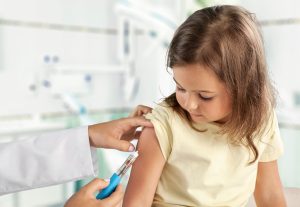Vaccine hesitancy is growing in some European countries. Counterstrategies are necessary at a national level and also in cooperation between states.
Text: Dietmar Schobel

“A growing number of people in some European countries doubt the effectiveness and safety of vaccines,” says Andrea Ammon, Director of the European Centre for Disease Prevention and Control (ECDC). She believes that this is also due to the fact that to a certain extent vaccines are the victim of their own success: “Let’s take poliomyelitis, for example. Back in the 1960s and 1970s everybody knew at least one person who was affected by this serious disease. Nowadays it has disappeared from Europe. As a result, some people have become less aware of the vaccination’s importance.”
A growing number of people in some European countries doubt the effectiveness and safety of vaccines
ANDREA AMMON, DIRECTOR OF THE EUROPEAN CENTRE FOR DISEASE PREVENTION AND CONTROL
Increasing vaccine hesitancy has specifically contributed to a decline in the measles vaccination coverage rate. In the European Union (EU) and the European Economic Area the number of countries that have achieved immunisation coverage of at least 95 per cent with two vaccinations fell from 14 to 4 between 2007 and 2017. Between January 2016 and March 2019 over 44,000 cases of measles were reported in the region.
A “Eurobarometer survey” in March 2019 commissioned by the European Commission supplies the latest data and facts on the attitudes of Europeans towards vaccination. On average, 88 per cent – almost nine out of ten people – in the EU countries agree with the statement that “vaccines are important to protect not only yourself but also others”. There are considerable differences between the countries, though. For example, almost 100 per cent of the Finns, Dutch and Portuguese are convinced that vaccines are immensely important. This figure is only around 75 per cent in Austria, Romania and Bulgaria.
Only five per cent are “real vaccine opponents”
“Surveys on this topic have given us the knowledge that only about five per cent of people are ‘real vaccine opponents’ who have held incorrect assumptions about vaccines over a long period of time,” says Andrea Ammon. While this group most likely will not be convinced by more information, it is all the more important to increase the knowledge of vaccines among the rest of the population. There is huge potential for that. Only four fifths of Europeans know that vaccines are rigorously tested before being authorised and merely just about half are aware that vaccines cannot cause the disease against which they protect.
Doctors can play a crucial role in reducing vaccine doubt. As many as 65 per cent of respondents in the Eurobarometer survey gave their “general practitioner, a doctor, or a paediatrician” as their most trusted source of information on vaccination. 12 per cent stated the health authorities, nine per cent other healthcare workers, like nurses or specialist doctors, and four per cent named pharmacists. Just one per cent stated online social networks as the most credible source of information on the topic of vaccines.
However, some medical professionals are also vaccine opponents. Training for doctors is therefore especially important: on the one hand in order to keep their knowledge up to date at all times, and on the other hand to communicate to them how they can pass on their knowledge of vaccines to patients in the best possible way, and how they can react to queries by worried parents. “Viewed as a whole, specific combinations of measures are necessary in the individual European countries in order to boost confidence in vaccinations. The country profiles prepared by ECDC are a good starting point for this,” says Andrea Ammon.
More cooperation
ECDC will explore whether a better alignment of vaccination schemes across all countries would be feasible. The fact that these differ in some respects from country to country is used by anti-vaccinationists as a welcome argument against the scientific soundness of vaccine recommendations. Increased cooperation in the fight against diseases that can be avoided by vaccines is also demanded in a recommendation by the European Council from December 2018, and in early 2019 a committee of European experts discussed this topic on ECDC’s initiative. Electronic vaccination registers are also expected to bring improvements, as they will enable more detailed documentation and also targeted reminders about necessary vaccinations. These digital tools have already been introduced in some European countries, and in others they are planned.
Countermeasures against vaccine hesitancy are urgently needed.
SIBILIA QUILICI, EUROPEAN PUBLIC POLICY DIRECTOR AT MSD

“People have doubted vaccines ever since they were first developed at the end of the 19th century. It isn’t a new phenomenon. However, the situation has worsened in Europe over recent years and countermeasures are urgently needed,” remarks Sibilia Quilici, European Public Policy Director at the global pharmaceuticals company MSD. Improvements must be made in the areas of convenience, confidence and complacency, she explains. As part of this, it is important to:
* Make vaccines as easily accessible as possible in relation to both time and place
* Increase trust in state institutions, which has considerably declined in some countries
* Make it clear that the fact that many diseases prevented by vaccinations are almost or entirely extinct in Europe does not mean that vaccine protection is no longer necessary.
Preventing deaths
From the perspective of vaccine producers, it is also important to ensure reliable supply. “This is a challenge that requires long-term planning because depending on the type of vaccine it can take up to three years to produce and deliver a vaccine,” explains Sibilia Quilici. She summarises: “Over the life-course of an individual, 16 infectious diseases can now be routinely prevented thanks to the corresponding vaccines available in Europe. Unfortunately, access to these vaccines varies across the region. We need to harmonise the use of the public health tool that vaccines represent to benefit from its full potential. Every death that could have been prevented by a vaccine is one too many.”
DATA AND FACTS

The Standing Committee on Vaccination (STIKO) at the Robert Koch Institute in Germany has named 16 diseases that can be prevented by vaccines. These are diphtheria, tetanus, whooping cough, Haemophilus influenzae b, poliomyelitis, hepatitis B, measles, mumps, rubella, chickenpox, influenza, pneumococci, human papillomaviruses (HPV), meningococci, rotaviruses and shingles. A study by the Faculty of Medicine at the University of Liège in 2016 examined the costs of vaccinations against up to 17 diseases during a person’s lifetime in Western Europe. These differ greatly from country to country. Including administration costs, they amount to between 443 euros for a healthy man in Sweden and 3,395 euros for a woman with underlying conditions in England.
